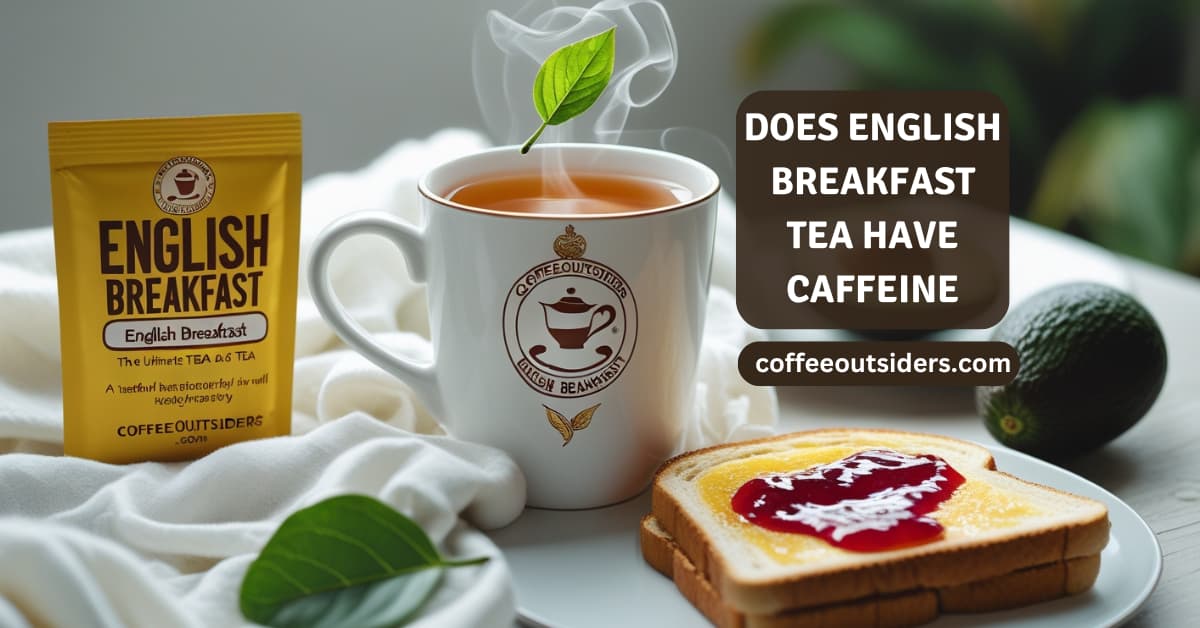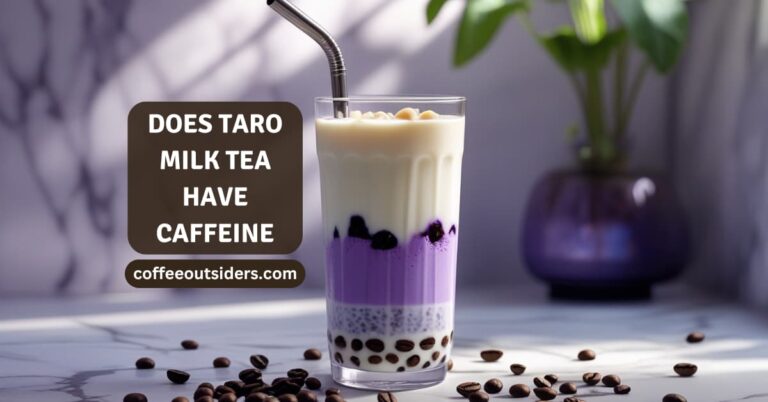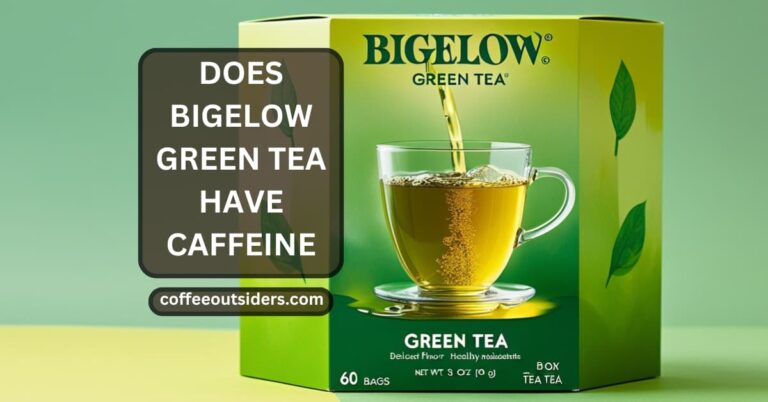Does English Breakfast Tea Have Caffeine: A Complete Guide
These teas do indeed all contain caffeine, but the amount can vary depending on the brewing time and the tea type (black, green, etc.).
On average, an 8-ounce cup has approximately 40-70 milligrams of caffeine. This quality to it makes it popular for anyone who wants an energy boost that’s strong, but not as strong as coffee.
Its rich flavor and full-bodied character make it a natural choice. You can drink it straight or add milk and sugar for a traditional English breakfast beverage.
- English breakfast tea is a strong blend of black teas. Typically a blend of Assam, Ceylon, and Kenyan tea leaves, English Breakfast Tea is famous for its bold flavor and versatility as either a morning or afternoon drink.
- Like many black teas, it does have caffeine, typically around 30 to 50 milligrams per cup. This is lower than coffee but higher than green or white teas, giving you just the right amount of energy uplift.
- Brewing time, tea leaf type, water temperature, and serving size affect the caffeine. You can be the master of your own tea-drinking fate with these variables!
- Moderation is key to safe caffeine consumption. It has great positive effects, including better focus and more energy, but overconsumption gets you negative side effects such as jitteriness or insomnia.
- Decaffeinated English breakfast tea provides the same delicious flavor that you love. This alone makes it a great option for anyone looking to enjoy a caffeine-free pick-me-up.
- If you’re looking to reduce your caffeine consumption, start by experimenting with shorter brewing times. Alternatively, choose decaffeinated teas or brew your tea with milk or water to make them less strong and caffeinated.
What Is English Breakfast Tea
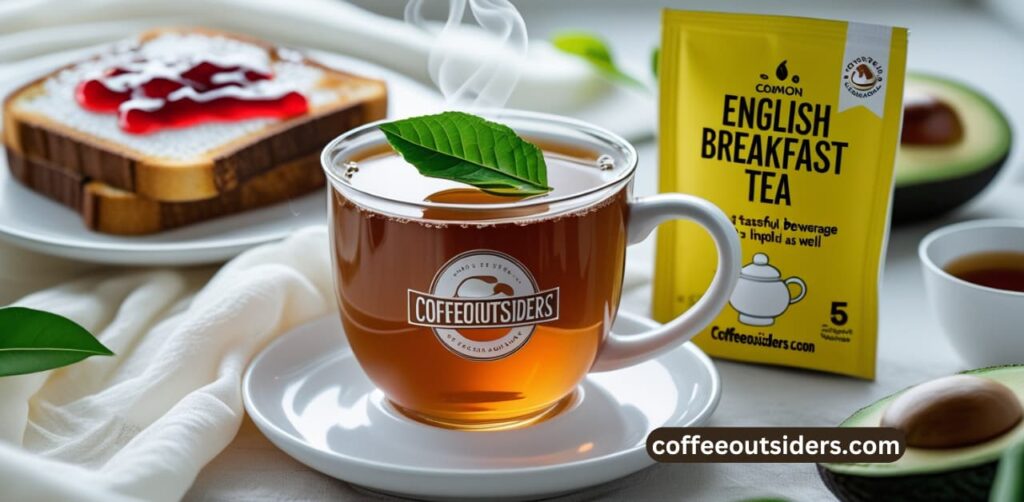
Definition of English Breakfast Tea
English breakfast tea is a traditional blend of robust black teas that brews up a hearty and full-bodied flavor. This breakfast tea combination usually includes teas from Assam in India, Ceylon in Sri Lanka, and estates from Kenya. Each region brings its own unique flavors and characteristics, making this blend a favorite among tea enthusiasts.
It’s fair to say the combination of these regions produces an interesting mix. Complex in flavor, this brew is known for its malty undertones and its bright, vivacious personality. With a high caffeine content, English breakfast tea packs a bold and energizing taste, making it an ideal tea for a morning boost.
It’s the perfect pick-me-up to get your morning routine going! Since English breakfast tea has always been served hot, it becomes a soothing drink to wake up to in the morning.
Or, for those who love the strength and smoothness of the brew in its unadulterated state, it can be served as it comes. For some, milk and sugar make it even better, tempering the fierce flavor with a smoothness that brings out the tea’s naturally creamy character.
Some even add a dash of honey or a slice of lemon to personalize the taste. This versatility is just one of the reasons behind its popularity as a flavorful tea.
Popularity and Common Uses
English breakfast tea occupies the highest ranks among black teas on the global stage. Its universal popularity is due in large part to the tea’s versatility and its capacity to complement myriad cuisine with ease.
It is traditionally enjoyed as a breakfast drink, usually with robust breakfast fare such as eggs, sausages or buttered toast. The boldness of the tea brings everything together, making for a bright, yet hearty meal that’s really hard to beat.
Outside of breakfast, it’s a go-to tea for an afternoon pick-me-up. Sip it when you’re in the midst of a busy workday and need a little boost.
Or, enjoy it as part of an authentic British tea service for a truly enjoyable treat! Its caffeine content in an 8-ounce cup averages 42 milligrams, just enough to give you a little extra alertness without overdoing it.
For anyone watching their caffeine intake, using a shorter steeping time will reduce the caffeine to around 14 milligrams per cup. The exact origins of English breakfast tea are a bit shrouded in history.
One theory points to a Scottish tea master named Drysdale as responsible for its introduction in 1892. Today, this quintessentially British tea is beloved all around the world for its smooth, yet hearty taste.
People drink it straight and with milk, sugar, lemon, or other creative additions. This versatility was the key to its dense and tasty domination.
Does English Breakfast Tea Have Caffeine
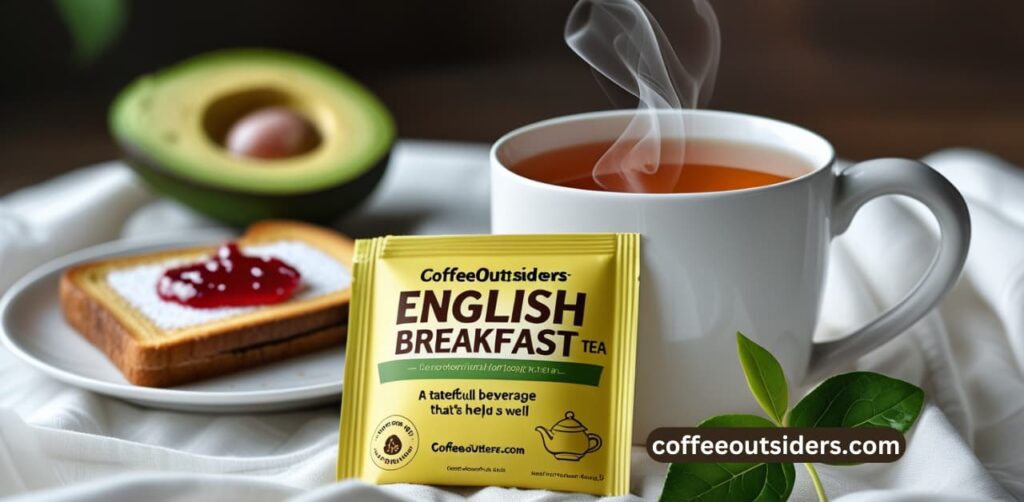
1. Caffeine content in English breakfast tea
English Breakfast tea does have caffeine, which is just one aspect of what makes it a popular morning tea. A typical 8-ounce cup contains around 42 milligrams of caffeine depending on the brand. If you first steep the tea for only one minute, the caffeine content would be around 14 milligrams.
Steeping it for five minutes pushes it up to an average of 42 milligrams per cup. On average, black teas have 40-60mg of caffeine per 8oz serving. As you can see, this range is right in line with your training data.
The caffeine content in English Breakfast tea can vary quite a bit based on a number of factors. The type of tea leaves you pick makes all the difference. Some blends have been made with varieties that naturally have more or less caffeine.
Brewing techniques are important too. It’s science. Longer steeping times will extract more caffeine, but if you want a milder choice, a shorter steep will do the trick. For example, using a short three-minute steep will yield only around 22 milligrams of caffeine, making it a more delicate option.
These differences give tea drinkers the flexibility to find their desired level of caffeine.
2. Comparison with other teas
Compared to other popular black tea blends, English Breakfast tea has a high caffeine content. This includes classics like Earl Grey and Assam. These teas can be in the 40 to 60 milligrams range per cup brewed, based on strength and brewing time.
Black teas usually contain more caffeine than green or white teas. Even this is relatively moderate when you compare it to coffee. Green tea generally has about 20 to 35 mg/cup. On the other hand, white tea typically contains even less caffeine, often under 20 milligrams.
English Breakfast tea isn’t really any stronger than other black teas. Its allure lies in its delicious, smooth flavor—not only in its caffeine kick. It’s not just about the caffeine; it provides a more consistent energy boost that helps you power through.
With this tea, you get a lot of versatility for black tea lovers. You can enjoy it without fear of a strong or heavy infusion.
3. Comparison with coffee
When it comes to caffeine amounts, English Breakfast tea has much less caffeine than coffee. A typical cup of coffee contains about 95 to 200 milligrams of caffeine. That can vary depending on how the coffee is brewed and which beans are used.
In comparison, a standard 8-ounce cup of English Breakfast tea contains about 47 milligrams. Even at its highest, it’s still well under coffee’s caffeine range.
English Breakfast tea has enough caffeine for tea drinkers to enjoy its flavors and aromas. They are able to do it without the crash or jitters that coffee tends to bring.
People find that this method is a more calm and soothing way to get their day started. It gives you just enough pick-me-up to feel awake, but not too much to make you jittery.
If you’re concerned about the caffeine, here’s some good news—it’d take roughly nine cups of black tea to reach the 400 milligrams FDA daily limit. All this makes black tea a better, safer and more moderate alternative to put into your everyday life!
Factors That Affect Caffeine Levels
Understanding the factors that influence caffeine content in English breakfast tea gives you the power to create your perfect cup. Customize your cup to suit your tastes just right! These four factors play a huge role in how much caffeine you’ll find in your cup.
Put together, one factor is the raw ingredients that go into how much caffeine you get to enjoy. Let’s take a look at each of these factors one by one. That way, you can choose according and enjoy your tea in the way you like best.
1. Impact of Brewing Time
The longer you steep your English breakfast tea, the more caffeine it will have. The longer the time, the more caffeine comes out of the leaves and into your cup. Allow your tea to brew for five minutes or more for a strong, full-bodied taste.
When brewing with a longer steeping time, this too increases caffeine levels, with an 8-ounce cup going up to 70 milligrams. Shorter brew times, as little as three minutes, produce a milder flavor and less caffeine. A more fragile brew could be nearer to 40 milligrams of caffeine per cup.
Try different steeping times to find what works for you, achieving the optimum level of boldness and caffeine. If you like a milder cup, steep for a shorter time and experiment to find your sweet spot.
2. Influence of Tea Type and Blend
Not all English breakfast teas are created equally. The type of tea leaves and the blend itself plays a big role on caffeine content. Blends produced with leaves from the Assam variety provide a more robust taste.
They have a bit more caffeine than similar drinks made with Ceylon tea. The source of the tea also makes a difference. Generally, spring-harvested teas tend to have higher concentrations of caffeine than second or third flush teas harvested later in the year.
Brewing black tea blends is one of the best ways to learn how these black tea differences align with your caffeine preferences. Other brands sell English breakfasts with a more moderate amount of caffeine, an average of 40-50 milligrams per eight-ounce cup.
Being mindful of these factors will lead you to a combination that suits your style.
3. Role of Water Temperature
How hot your water is when you brew with it will make a difference in how much caffeine is extracted. As the hotter water brings out more caffeine from the leaves, this means you’ll wind up with a stronger, bolder brew with more caffeine.
If you want a brighter flavor that’s less caffeinated, brewing with water that’s a bit cooler will help. Experimenting with different water temperatures is another method to adjust caffeine content and flavor.
If you want a more potent cup, don’t stray too far from boiling water, about 200°F. For a less assertive flavor, use water that’s around 185°F.
4. Serving Size and Steeping Method
How much tea leaves you use and how you steep them affects the caffeine content you get too. A good rule of thumb is roughly 1 teaspoon of loose leaf tea for every 6.7 ounces of water. Since using more leaves will obviously produce a stronger caffeine level, measuring out your servings will help you achieve consistent results. Steeping techniques can significantly impact the flavor and caffeine levels.
Since using more leaves will obviously produce a stronger caffeine level, measuring out your servings will help you achieve consistent results. Steeping techniques make a difference.
For tea enthusiasts, understanding the tea types and their caffeine levels is crucial, especially when aiming for that morning boost. Whether you prefer a robust breakfast blend or a lighter green tea, your approach can greatly affect the overall experience.
Health Effects of Caffeine in Tea
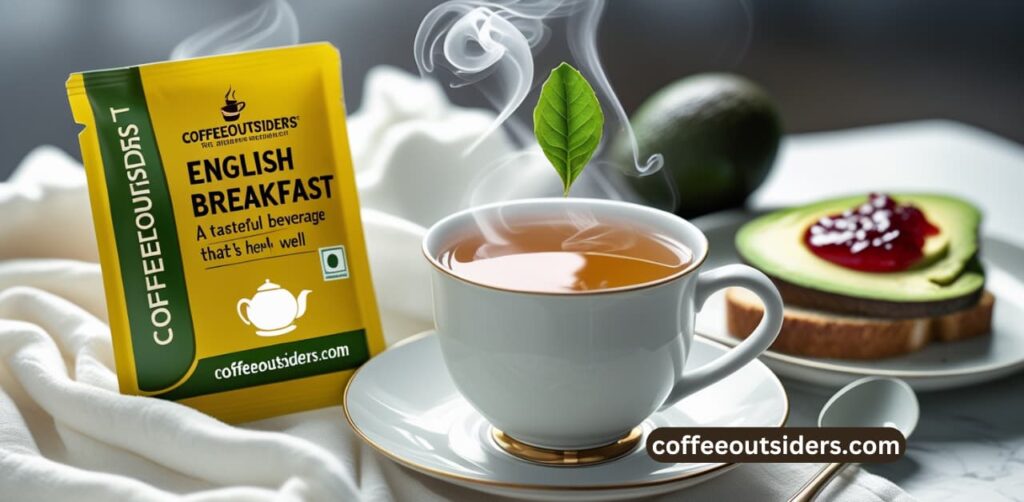
Benefits of caffeine consumption
The caffeine in tea, such as that in English Breakfast tea, provides a number of potential health benefits when enjoyed in moderation. One of its major benefits is increasing energy levels. English Breakfast tea provides a modest boost with 40 to 70 milligrams of caffeine per 8-ounce cup.
This energy lift keeps you alert without the jitters that can accompany a highly caffeinated beverage like a typical cup of coffee, which can range from 95 to 200 mg of caffeine. This makes it a perfect choice for anyone seeking a gentler pick-me-up.
Caffeine is a key ingredient when it comes to enhancing focus and cognitive function. It stimulates your central nervous system stopping you from feeling drowsy and improving your attentiveness when doing demanding tasks. Research shows that moderate caffeine consumption improves learning recall as well as reaction times.
This benefit is particularly valuable for the students and professionals who juggle intense schedules. For those who are active, caffeine can improve workout performance and endurance. It accomplishes this through raising adrenaline levels and enhancing the process of mobilization of fatty acids from fat stores.
This can lead to better endurance while exercising. Studies confirm what most caffeine consumers already know—that caffeine burns fat. When used in conjunction with consistent exercise, tea can be one of your most potent allies in achieving your metabolic health and weight management goals.
English Breakfast tea is rich in antioxidants, including flavonoids, which help promote good health. These compounds actively neutralize damaging free radicals in the body. This process likely helps lower the risk of chronic diseases and promotes a healthy heart.
Potential side effects of caffeine
Though caffeine does have a number of health benefits, too much caffeine can have negative consequences. If you drink above the FDA-recommended 400 milligrams of caffeine a day, you might feel jittery, have an elevated heart rate, or be anxious. This is particularly the case for individuals who are sensitive to caffeine.
One cup of English Breakfast tea has 40-70mg caffeine. For others, this amount might produce minor effects such as jitters or inability to concentrate.
For sensitive people, this can lead to insomnia, since caffeine inhibits adenosine, the chemical in your brain that helps you sleep. So pay close attention to your brewing time! Leaving tea to steep for more than five minutes can increase its caffeine levels and amplify these effects.
For others, caffeine may cause mild GI discomfort or a dehydration effect. Tracking your intake and paying close attention to how your body responds will go a long way in helping you sidestep these problems. Sensitive populations, such as those who are pregnant or breastfeeding, should seek individualized dietary advice from qualified healthcare providers.
Moderation for safe consumption
As with all things caffeinated, moderation is the way to go when drinking English Breakfast tea. By limiting your intake to three to four cups per day, you enjoy the health benefits while avoiding potential side effects. In fact, one cup of tea has only 10% to 15% of your daily suggested caffeine limit.
That allows you to enjoy your tea while still staying well within safe levels. To avoid risking disturbances to your sleep, aim to have your final brew by the afternoon. If you’re concerned with long-term effects, fear not.
The reliable caffeine levels in both tea bag and loose leaf formats mean you can easily monitor your consumption. Brew to taste. Brew brewing times to maximize flavor and minimize caffeine—five minutes is the upper limit for great flavor and low caffeine.
If you’re pregnant, breastfeeding, or managing a health condition, it’s important to consult a healthcare professional. They can assist you in consuming caffeine in a way that suits your individual desires.
Decaffeinated English Breakfast Tea
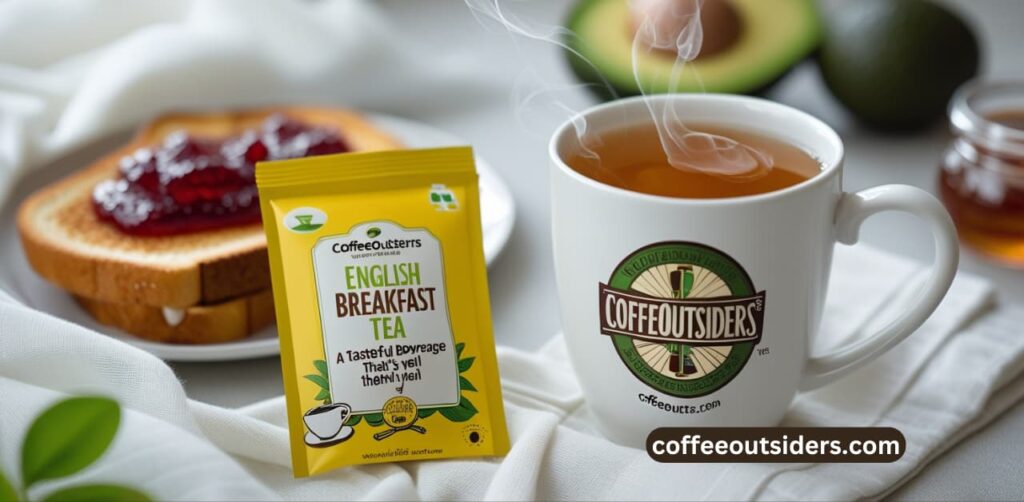
What is decaffeinated tea
Decaffeinated tea is simply tea that’s been through a process to remove the vast majority of its caffeine. This process typically involves methods such as steaming or soaking the tea leaves. These methods are useful for removing caffeine from the leaves.
Decaffeination removes about 97 percent of caffeine in coffee. In fact, it removes all but 2 to 5 milligrams of caffeine per cup. A normal cup of English breakfast tea contains around 40-70mg of caffeine. So, decaf is really a much kinder alternative!
Due to this process, decaffeinated teas may have a slightly different flavor and aroma profile. A lot of decaf English Breakfast teas still have a pleasantly hearty taste. The good news is I’ve discovered that Arbor Teas has a pretty stellar decaf English Breakfast tea.
Its hearty flavor holds up remarkably well to milk and sugar! This greatly appeals to tea lovers. Now they can sip the iconic English Breakfast Tea they love, without the stress of caffeine! I’ve been drinking decaf tea for a long time now. This new-to-me blend is now one of my favorites!
How it differs from regular tea
What’s the difference between decaffeinated English breakfast tea and regular English breakfast tea? When tasting decaffeinated English breakfast tea versus the regular version, the biggest difference is obvious. Regular English Breakfast tea is a hammer of a breakfast tea, in terms of the strong stimulating effects.
For taste, decaf tea may be missing a nuance of its full-bodied flavor that gets filtered out in the caffeine removal process. Fortunately, many excellent decaf English breakfast teas maintain a rich flavor profile. Organic and Fair Trade Certified varieties from Arbor Teas are excellent examples of this flavorful tea option.
For decaf drinkers, I’ve been blending regular and decaf coffees for years to achieve that nice, strong flavor. This balance allows me to enjoy several cups without feeling jittery. The combination of regular and decaf offers a convenient way to appreciate the best of both worlds.
Decaffeinated tea still contains most of the health benefits that regular tea has to offer, including antioxidants and polyphenols, which help protect your body and support gut health. It’s not your average tea, but it has plenty of awesome reasons to make it a part of your collection.
You’ll be glad to have this unique tea variety in your collection, especially if you appreciate the rich history and origin of English breakfast tea. It’s perfect for those who love a morning boost without the jitters that come from a typical cup of drip coffee!
Caffeine content in decaffeinated tea
Even though they’re named “decaffeinated,” these teas aren’t 100% caffeine-free. The majority of cups have 2-5 mg of caffeine. That’s only about 30% of that found in typical English Breakfast tea.
This scant quantity likely won’t provide the energizing kick of an average joe. It’s a great choice for caffeine-sensitive drinkers or those looking to cut back on their daily intake.
It’s best to check labels for exact decaffeinated tea caffeine content when purchasing decaf teas. Arbor Teas decaf English Breakfast tea is the tea I’ve been drinking for years as my decaf before bed go-to.
It’s a perfect example of a well signed, eager to please alternative! This tea packs a punch with its robust taste, but without the caffeine kick. Well, that’s why I can’t stop coming back!
I finally found an organic, Fair Trade Certified decaf English Breakfast tea. This makes it even more valuable for anyone who seeks out the most sustainable options in their purchases.
Tips for Reducing Caffeine in Tea
Reducing caffeine in your tea doesn’t have to be complicated—sometimes it just takes a little planning! Whether you’re aiming to consume less caffeine overall, or just enjoy a softer cup, many smart techniques are worth your experimentation. We hope you’ll give these tips a try!
Here are some in-depth suggestions to get you started reducing the caffeine content of your English breakfast tea. You’ll still be able to enjoy all its robust flavor even after doing so!
Use shorter brewing times
One of the best methods for cutting down on caffeine in your tea is to decrease the brew time. With each minute that goes by, your tea is gradually releasing more and more caffeine. If you prefer a milder cup, be sure to steep for a shorter time!
Begin by brewing the tea for a short 1 to 2 minutes. This will help cut caffeine levels considerably and stop your tea from brewing bitter. If the taste seems too weak, experiment with a longer steeping time. Continue to experiment until you reach the ideal combination of taste and caffeine that works for you.
If you’re brewing from a regular tea bag, brew for 1 minute. Next, sample the tea, and if you’d like to continue brewing the tea, add 30 seconds to the total time. This technique allows you to reduce the caffeine content and adjust the strength of the tea to your personal preference.
It’s especially useful for anyone who’s new to English breakfast tea or someone who’s caffeine sensitive.
Opt for decaffeinated options
Decaffeinated English breakfast tea is a great option for anyone looking to reduce caffeine completely. The majority of decaf English breakfast options preserve the rich taste expected from traditional English breakfast tea. You can enjoy its bold, full-bodied flavor as usual!
Brands such as Twinings, Bigelow, and Harney & Sons all have well-known decaf options. You can easily purchase them at a grocery store or online. Decaf tea is particularly great in the evening when you’re looking to relax without interrupting your sleep.
Replace your normal evening cuppa with a decaf. This allows you to embrace the calming ritual of tea-drinking without the stimulating effects of caffeine. If you are sensitive to caffeine, you are in luck! It’s an effective and delicious solution for anyone who wants to cut back for health reasons.
Dilute with milk or water
An easy way to consume less caffeine in one go is by diluting your tea, either with milk or water. Lactose deepens the creaminess and richness in taste, and the presence of milk reduces the caffeine concentration. For a traditional English breakfast tea with milk, aim for one part tea to one part milk.
Smooth and comforting, people can’t get enough of this method. It’s the ideal accompaniment to hot or iced tea. Dilute your tea with a splash of hot water. This will tame its potency and increase its thirst-quenching power!
Experimenting with different ratios of tea to milk or water can help you find a combination that suits your taste and caffeine preferences. If your regular cup of joe ends up being a little too intense, add 1-2 additional ounces of milk or water. This will make your drink a lot lighter and more balanced!
Additional Considerations
When you’re trying to reduce caffeine intake, remember to account for all sources of caffeine throughout the day. Health professionals advise that most adults should remain below 400 milligrams of caffeine daily. For pregnant women, that limit plummets to only 200 milligrams.
If you’re drinking coffee, energy drinks, or soft drinks, the caffeine can add up fast. Be conscious of what you’re drinking to help manage the caffeine in your diet! If you have health conditions that are sensitive to caffeine, consider beginning with a smaller serving of tea, such as half a cup.
When you feel ready, start enjoying a cup or two per day. If you’re looking for a caffeine-free option, try our herbal teas. Green tea is another good option, with 25-29 milligrams of caffeine per 8-ounce cup. These alternatives can provide exciting flavors and experiences all while keeping your caffeine consumption in a safe range.
Conclusion
The robust, silky taste of English breakfast tea is elevated by a smooth, natural caffeine boost. Its caffeine content makes it a great choice for a pick-me-up any time, especially mornings or a mid-day energy dip. Caffeine content can vary depending on the brew time and the blend you select. You have the control to change these factors to suit your needs! For anyone who wants to reduce their caffeine consumption, decaffeinated versions or brewing for a shorter time are effective without sacrificing taste.
Health conscious tea drinkers can indulge in the benefits of moderate caffeine, benefiting from enhanced focus and alertness. They can also avoid going overboard by being more mindful of their intake. Whether you like it loaded with caffeine or not, there’s no denying English breakfast tea is a welcome addition to any lifestyle. Brew your cup of perfection and savor its robust flavor and consistent caffeine kick.
Frequently Asked Questions
So, does English breakfast tea have caffeine? This flavorful tea, similar in caffeine content to black tea, typically contains around 40-70 milligrams of caffeine in an 8-ounce cup. The precise amount can vary based on factors like the specific breakfast tea combination and how long you brew it.
Compared to coffee, English breakfast tea is much lower in caffeine content, making it an ideal tea for those who want a morning boost without excessive caffeine. The average 8-ounce cup of coffee has about 95-200 milligrams of caffeine versus 40-70 milligrams per cup of this flavorful tea.
Plus, as with anything, you might want to limit English breakfast tea due to its caffeine content. The decaf breakfast tea blend is a perfect replacement that offers a much lower caffeine content while maintaining the same robust flavor you love.
If you want to enjoy a flavorful tea with lower caffeine levels, limit English breakfast tea steeping to about 1-2 minutes. Alternatively, you can discard the first brew and steep the loose leaf tea a second time for a lighter cup.
Decaf English breakfast tea, while maintaining a similar caffeine content to traditional tea, will likely be a bit less robust in flavor. It’s an excellent option for tea enthusiasts looking to limit English breakfast tea caffeine content while still enjoying the classic breakfast tea combination.
In moderation, caffeine — a key component of English breakfast tea and similar caffeine content found in green tea — can help to improve alertness and focus. Too much can lead to jitteriness or sleep disturbance, so limiting English breakfast tea is essential for a balanced morning routine.
Is caffeine in tea good for you? English breakfast tea caffeine content is often associated with boosting metabolism. This flavorful tea is a source of L-theanine, which promotes relaxation and helps balance caffeine’s effects.

